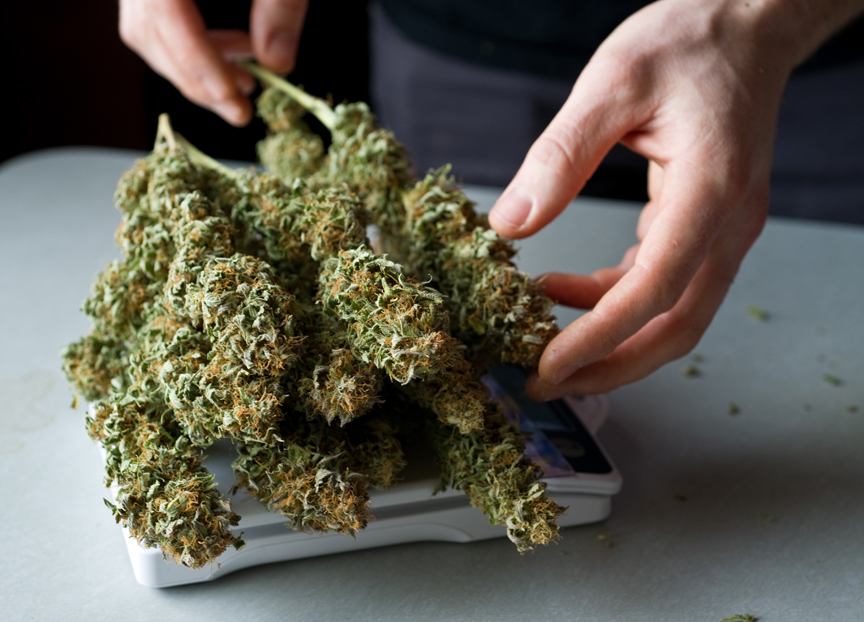A bill fixing a problem with the ballot measure that legalized marijuana in Alaska is advancing toward a final vote.
House Bill 75 advanced out of conference committee on a 6-0 vote on Monday morning, bound for votes on the House and Senate floors. The bill, drafted last year, has been put on a diet and now includes just three core provisions.
The first provision limits home marijuana grows to six plants (three flowering) if one person lives in a home. If two or more people live in a home, the limit is 12 plants (six flowering).
The second provision allows unincorporated communities with 25 or more residents to opt out of the commercial marijuana industry by holding an election.
The third provision calls for the Alaska Supreme Court to set a bail schedule for new, minor marijuana offenses.
Those provisions are the result of a compromise between the House and Senate, which passed differing versions of the bill. A conference committee was appointed to iron out the differences.
“They got the plant limit, and we got the opt-out,” said Rep. Cathy Tilton, R-Wasilla and chairwoman of the conference committee.
The House had favored a 24-plant limit, with the Senate preferring the 12-plant limit.
On commercial sales in unincorporated areas of the state, the House had favored an opt-out election, while the Senate favored opt-in language.
The opt-in language, promoted by Sen. Lyman Hoffman, D-Bethel, would have banned commercial marijuana businesses in all areas of the state not within an incorporated city or borough. Home-grown marijuana and personal use would still have been allowed.
Hoffman declined to comment for this story, but Tilton said the key to obtaining a compromise was simply “time.”
Had the conference committee not acted, the state’s unincorporated towns and villages would have no way to prohibit local sales. The plant limit on a given home would have been six plants per person with no maximum per house or structure.
Under the approved language, if a borough allows commercial operations but a community within that borough forbids them, the community’s rule takes precedent within the boundaries of that community. For unincorporated communities, the municipal boundary is a circle with a five-mile radius centered on the local post office. If there is no post office, the community’s local governing body will select an alternative.
The bill must be approved in House and Senate floor votes and signed by Gov. Bill Walker to become law.
No commercial marijuana licenses have yet been issued. The first cultivation and testing licenses are expected June 9. The first retail sale licenses are not expected until the fall.
Public comment opens on ‘cafe’ regulation
When retail sales begin this fall, marijuana retailers could be eligible for an “on-site consumption endorsement” that allows a cafe-like operation. In Juneau, such an operation would still be subject to the borough’s no-smoking ordinance, which bans indoor smoking.
The rules for this endorsement are now open for public comment. To view the draft regulation, visit http://1.usa.gov/1XvE0eS. To submit a comment on the draft, email john.calder@alaska.gov with “onsite consumption endorsement” in the subject of the email.
Marijuana handler cards available
Anyone who works at a commercial marijuana business will be required to undergo training and receive an Alaska Marijuana Handler Card from the state.
Application forms for cards were available from the state starting Monday. To apply for a card, first complete a training course through www.handlealaska.com or www.akmjhandler.com.
Anyone who has completed the course can visit www.commerce.alaska.gov/web/amco/MarijuanaApplication.aspx, select “initiate marijuana application,” log in to myAlaska, then select “apply for a new handler permit.”
Permit cards are $50, and that cost does not include the cost of a training course. In Juneau, applicants will need to bring a training certificate, printed application form, a passport-sized photo and a photo ID to the enforcement officer stationed here.
To schedule an appointment, call Steve Johnson at 465-2330 or email steven.johnson@alaska.gov.

